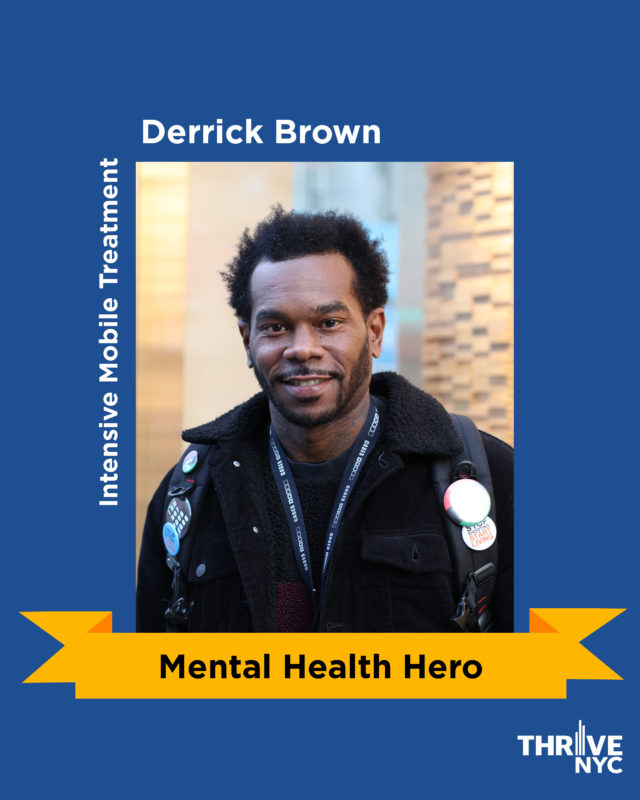Intensive Mobile Treatment: Delivering a much-needed human touch
 The Center for Alternative Sentencing and Employment Services (CASES) provides supportive services for people with criminal justice involvement and behavioral health needs to help maximize their opportunities for success. One critical form of support CASES offers is an Intensive Mobile Treatment (IMT) team that provides intensive, highly-catered care to clients with serious mental illness. Jairu Siwazuri and Derrick Brown, two IMT team members at CASES, worked hard to reach and serve clients despite the obstacles created by the COVID-19 pandemic.
The Center for Alternative Sentencing and Employment Services (CASES) provides supportive services for people with criminal justice involvement and behavioral health needs to help maximize their opportunities for success. One critical form of support CASES offers is an Intensive Mobile Treatment (IMT) team that provides intensive, highly-catered care to clients with serious mental illness. Jairu Siwazuri and Derrick Brown, two IMT team members at CASES, worked hard to reach and serve clients despite the obstacles created by the COVID-19 pandemic.
With nine team members, IMT teams include a nurse like Mr. Siwazuri and peer specialists like Mr. Brown. Each member of the team works with clients in different capacities. As the team’s nurse, Mr. Siwazuri was committed to serving clients in person, even when that meant traveling to COVID-19 hotspots. Donned in full PPE, he met clients five days of the week to deliver medications and connect them to vital services like meals and shelter, especially as the pandemic intensified.
One of those clients was an older man who had an array of mental health and physical health issues. When Mr. Siwazuri began to work with him, he had Hepatitis C, struggled with substance use, and needed an operation for a medical problem in his eye. Since then, Mr. Siwazuri has accompanied him to every appointment, administered his medication, and made the necessary arrangements for his eye operation. In recent months, the man celebrated a year of sobriety, thanks, in part, to Mr. Siwazuri’s steadfast support.
“We believe this client would not be alive if it weren’t for Jairu,” said Patricia Haversham- Brown, Director of Intensive Mobile Treatment at CASES. “I always say, I wish he was my nurse – and that says everything you need to know about him.”
As the team’s peer specialist, Derrick Brown has been an equally important source of support for IMT clients.Although Mr. Brown first started on the team as an intern, he quickly built bonds with clients by drawing on his experience with homelessness, the criminal justice system, and his path toward recovery. He’s often the first person a client meets when referred to IMT, and he’s developed a knack for breaking barriers with reluctant clients. As the COVID-19 pandemic hit its peak in the spring and some clients refused to wear masks, Mr. Brown was able to explain why it was so important to their health and safety—eventually convincing them to cooperate.
 “Derrick is able to share himself in a beneficial way to reduce the substance use, mental health, homeless, and criminal justice stigmas that are part of his clients’ history,” Haversham-Brown said. “He can show them, ‘This is where I am, and this is where I’ve come from,’ to give them an opening to see they can also change their lives.”
“Derrick is able to share himself in a beneficial way to reduce the substance use, mental health, homeless, and criminal justice stigmas that are part of his clients’ history,” Haversham-Brown said. “He can show them, ‘This is where I am, and this is where I’ve come from,’ to give them an opening to see they can also change their lives.”
When the pandemic hit, both Mr. Siwazuri and Mr. Brown delivered in-person support to clients—a much-needed human touch—at a time when many health services were transitioning to remote care. Director Haversham-Brown says that this in-person support makes all the difference in the lives of vulnerable New Yorkers with serious mental illness: “If we think about how it is for us, in a house by ourselves, think about how it is for them in a shelter, in a room by themselves. To be able to see someone and what they may need, the lightbulb goes off.”
From Mr. Siwazuri:
“I became a Mental Health Nurse to address disparities faced by my clients. It has been a pleasure to provide care to my clients that focuses on their mental health, medical, and social needs. The best part of my job is witnessing progress throughout their healthcare journeys.”
From Mr. Brown:
“I do this work because I’ve been through some of the same situations as the clients I serve. Anything is possible!”
AT A GLANCE: Intensive Mobile Treatment
• Full-service mental health treatment teams include psychiatrists, social workers, case managers, nurses, and peer specialists
• Teams serve clients who have:
o Had recent and frequent contact with the mental health, criminal justice, and homeless service systems,
o Displayed recent behavior that is unsafe and escalating, and
o Been poorly served by traditional treatment models
.
FAST FACTS
• Currently, there are 11 Intensive Mobile Treatment teams in New York City, with the capacity to serve 297 clients at any given time
• Since 2016, 91% of Intensive Mobile Treatment clients have continued to receive services for a year or more
• Since 2016, half of Intensive Mobile Treatment clients experiencing homelessness have secured non-shelter housing while working with Intensive Mobile Treatment teams
.